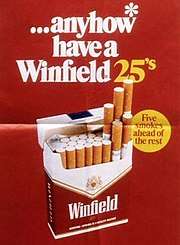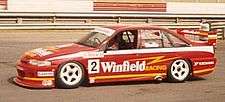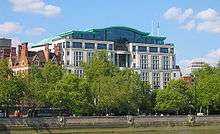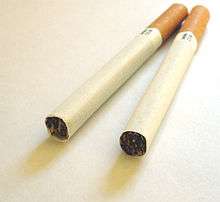Winfield (cigarette)
.jpg) An old French pack of Winfield cigarettes, with a French text warning at the bottom of the pack. | |
| Product type | Cigarette |
|---|---|
| Produced by | British American Tobacco Australia (BATA), a subsidiary of British American Tobacco |
| Country | Australia |
| Introduced | 1972 |
| Markets | See Markets |
| Tagline | "...anyhow, have a Winfield", "Australia's own since 1972", "The Genuine Australian" |
| Wikimedia Commons has media related to Winfield (cigarette). |
Winfield is an Australian brand of cigarettes, currently owned and manufactured by British American Tobacco Australia (BATA), a subsidiary of British American Tobacco.[1]
History
Winfield was launched in 1972 and entered the Australian market in the common pack size of 20's. They were the first brand in Australia to launch a pack size of 25's and used this to convey their image of being good value to the everyday Australian. Typical advertisements at the time noted that Winfield was "5 smokes ahead of the rest". Winfield remain available in Australia today in packs of 20, 25, 30 or 40 cigarettes.
Winfield's market dominance encouraged the development of menthol and lower tar varieties. Differing tar strengths are easily distinguished within the Winfield brand family by the pack colour—i.e. the strongest variety come in predominantly dark red packaging, the menthol variety in green etc. The differing tar strengths once gave the cigarettes different "official" names. The strongest variety, containing on average 16 mg of tar were Winfield Filters. The next strongest variety, containing on average 12 mg of tar were Winfield Extra Mild. However, due to the distinctive packaging the brand was colloquially referred to by the colour. A recent settlement between the ACCC and the tobacco industry in Australia resulted in the withdrawal of such descriptors as "Mild" "Extra Mild" and "Light" in relation to cigarettes, on the grounds that this may mislead smokers into thinking one cigarette was safer than another. This has mirrored recent developments in the United Kingdom as well. Other brands under BATA's control have opted to use "approved" descriptors such as "Smooth" "Rich" and "Fine", that the ACCC has approved as not misleading. However, with the Winfield brand BATA has opted to use the pack colouring as the descriptor. Thus the brand's differing products are now officially known by names which they had been colloquially known anyway, i.e. Winfield Red, Winfield Blue, etc.
In 1998, a "Deluxe Soft Pack 20" variant on the brand was released. These cigarettes were aimed at a more premium market, and differed in taste and strength from the traditional Winfields available in packs of 25. Winfield Deluxe Filters for example, contained 14 mg of tar, whereas the traditional Winfield Filter contained (and contains) 16 mg. This variant attracted a disappointing market share, and was consequently withdrawn from the market. Soft pack Winfields were relaunched in 2000, and have become the best selling soft pack cigarette on the Australian market. Apart from the packaging though, there is nothing to differentiate them from their hard pack counterparts. These have been discontinued in 2008, with information distributed to the trade in February announcing this decision.
In 2004, British American Tobacco Australia shipped 853 billion Winfield cigarettes in 2004, which made it the second largest tobacco company and Winfield the second largest brand in Australia after Altria and Longbeach. Both BATA and Philip Morris had a 40% market share on the Australian cigarette market.[2]
In 2006, a new product extension was made available in the Australian market, with a number of varieties being released in a charcoal filter. The packaging for these products varies from the traditional products with a predominantly brushed-silver package and coloured lettering indicating the strength (Blue, Gold, Sky Blue or White).
In 2014, Winfield introduced a new filter to some of its cigarettes, marketed as Tasteflow. The top half is hollow, which Winfield claims improves the taste of the cigarette while less of the filter touches the smokes mouth.
As of 2015, a 25-pack of Winfield Red costs $23.65 Australian Dollars.[3] The price was once again increased in 2017, meaning that a 30-pack of Winfield Blues went from $32.50 to $35.20 Australian Dollars, a tax increase of $2.70.[4][5]
Advertising and promotions

Winfield had also enjoyed a long and fruitful collaboration with Australian actor Paul Hogan, who helped popularise the brand through television and print advertising.[6][7][8] A series of amusing events would happen to Hogan, who would always end the advertisement by saying "...anyhow" and lighting a Winfield. The slogan "...anyhow, have a Winfield 25's" is still easily recalled today, even after cigarette advertising has long been banned in Australia.[9]
Today, the 'anyhow' slogan is very rare, except for appearing in some limited marketing materials.
Other slogans found on an Australian Winfield packet prior to introduction of plain packaging laws include "Australia's own since 1972" which is located on the silver foil insert, and "The Genuine Australian" on the top of the lid. Also, if looked closely onto the emblem of Winfield the motto "Force no friend, fear no foe" can be seen on older packets. If an old Winfield packet is turned upside down the word "PLAY" can be seen clearly. Since introduction of plain packaging, none of these mottos or slogans have been visible on cigarette packaging.
Sport sponsorship
Winfield was a major sponsor of sport in Australia until outlawed by the Tobacco Advertising Prohibition Act 1992 that banned all tobacco advertising and sponsorship from December 1995 onwards.[10] Some limited exemptions were granted for the Australian Grand Prix and the Australian Open Golf, hence Winfield was seen at the Australian Grand Prix in 1998 and 1999 when it was the title sponsor of the Williams F1 Team.[11][12]
Auto sponsorship

Winfield was the main sponsor of the Williams F1 Team in 1998 and 1999, when Rothmans International opted to promote their Winfield brand, replacing the popular blue and white livery with a red one.[13][14][15] In 1998, the team won no races and took only 3 podiums during the season, with Frentzen finishing in third at the first round in Australia and Villeneuve finishing third in Germany and Hungary. Williams finished third in the Constructors' Championship, scoring 38 points, while Villeneuve finished fifth in the Drivers' Championship with 21 points and his German teammate, Frentzen, finished 4 points behind him in seventh. In 1999, the team managed to get three podiums, all scored by Ralf Schumacher, with third place in the Australia and the Britain and a second place in Italy. The team finished fifth in the Constructors' Championship, the lowest finish for Williams in the 1990s; the team finished behind Stewart and Jordan, scoring a total of 35 points. Of those points, all were scored by Schumacher as Zanardi, who had not performed well in his previous stint in F1, failed to finish in the top six in any race. In 2000, Rothmans International had been purchased in 1999 by British American Tobacco, which owned British American Racing and chose not to renew the contract with Williams, ending the sponsorship of Winfield and earlier with Rothmans on the Williams cars.

From 1992 until 1995, Winfield was title sponsor of Australian motor racing team Gibson Motorsport. Highlights included Mark Skaife winning two Australian Touring Car Championships in 1992 and 1994, as well as the Australian Drivers' Championship in 1992 and 1993. Skaife and Jim Richards also won the 1992 Bathurst 1000.[16][17]
From the 1970s until 1995, Winfield sponsored a number of high-profile teams in Speedway and Drag racing.
Motor sponsorship
Winfield also sponsored the Honda Team in the Australian Superbike Championship from 1986 until 1995. Malcolm Campbell won the 1986, 1989 and 1990 editions in the Winfield-sponsored Honda VFR750F and Honda VFR750R bikes. and later Troy Corser and Anthony Gobert would also win the 1994 and 1995 editions with their Honda RC30 and Honda RC45 bikes.[18] After the Tobacco Advertising Prohibition Act 1992 was passed, Winfield no longer sponsored the team.
Winfield also sponsored the regular Superbike World Championship in 1994 and 1995,[19][20] as well as the annual Triple Challenge at Eastern Creek each January between 1992 and 1995.
Other sponsorship
From 1982 until 1995, it was title sponsor of the New South Wales Rugby League premiership with the winner of the grand final receiving the Winfield Cup. It also sponsored both test and club/franchise international rugby union in South Africa from 1995 until 1999 when tobacco advertising was prohibited there.
Controversy
Fake cigarettes containing more tobacco
In 2011, it was reported that various fake Winfield cigarettes were smuggled into Australia and were sold onto the black market.
Independent tests were carried out on a pack of Winfield Blues from both a real version and an illegal copy made in Asia and smuggled into Australia to be sold on the black market. The real Winfield Blues weighed 0.58g, whereas the fakes weighed 0.66g. The real ones lost 87 per cent of their weight when smoked, while the fakes lost only 84 per cent. The tests - performed by chemist firm Sharp and Howells and commissioned by The Daily Telegraph - appear to rubbish claims that fake cigarettes are significantly different or more dangerous than the real product. "The fake Winfield Blues come up higher." Sharp and Howells laboratory manager John Franceschini said. "The genuine Winfield Blues and the fake Intershop ones were quite similar."
A spokesman for British American Tobacco Australia, the maker of Winfield, said the tests were not exhaustive enough to determine true quality, although he acknowledged there was no such thing as a safe cigarette. "At the end of the day, smoking is harmful regardless of whether it's legal or illegal." the BATA spokesman said. "The issue with illegal tobacco is that 100 per cent of the profits go to the pockets of criminals while 70 per cent of the legal product sale goes to taxpayers through tobacco excise and tax."[21]
Trick in cigarette names
In 2012, an anti-smoking campaigner had accused Australian tobacco companies of "sexing up" their brand names to make them more appealing in the wake of plain packaging laws.
Australian Council on Smoking and Health president Mike Daube said manufacturers were introducing dozens of extended brand "descriptors" to meet the December 1 deadline for all products to be sold in plain olive green packets with all brand names in the same font and size. Among the changes were Winfield's Optimum Night cigarettes being called Crush Blue, Dunhill's Fine Cut becoming Fine Cut Burgundy and its Chilled product becoming Release Chilled Menthol.
Manufacturers claim the new branding will help retailers find the right product faster for their customers.[22]
Plain packaging law breach
In 2012, British American Tobacco was being investigated over possible breaches of the plain packaging laws that were introduced.
The cigarettes featured three-letter words at the top of each, which the department was investigating to see if they were a form of advertising, which would be banned under the legislation. In one instance, Benson & Hedges cigarettes were labelled with "LDN"; in another case Winfield cigarettes were stamped with "AUS". Under the plain packaging regulations, cigarettes are allowed to be branded with an alphanumeric code but it must not represent or in any way be related to the brand or variant of the cigarette. The Australian government had written to British American Tobacco Australia to see if the cigarettes in question were manufactured in the month of October 2012. If they were and are deemed to be in breach, the company could face fines worth more than $100 million and could also be forced to recall their products.
British American Tobacco Australia said it has received no notification from the Australian Health Minister nor the department. A spokesman said the company would be willing to discuss the issue with the regulator as it did not believe there had been a breach and the company had done nothing illegal.[23]
Winfield kangaroo logo in Europe
In 2012, Attorney-General Nicola Roxon had hit out at British American Tobacco for using iconic Australian images to promote cigarettes in Europe.
The Winfield cigarette packets on sale in France had a picture of a kangaroo on the front, with a map of Australia on the back, along with the words "An Australian Favourite". Ms Roxon said that it is shameful behaviour. "I think many Australians are going to be outraged that a big tobacco company all the way round the world is using Australia's healthy lifestyle to market their deadly products" she said.
A British American Tobacco Australia (BATA) spokesman dismissed Ms Roxon's attack. "British American Tobacco Australia does not market or manufacture Winfield in France. Another company within the BAT group does" he said.[24]
Markets
Winfield is mainly popular in Australia and New Zealand, but also was or still is sold in Papua New Guinea, Singapore, Malaysia, Canada, Luxembourg, Belgium, The Netherlands, Germany, France, Austria, Italy and South Africa.[1][25][26][14]
Winfield products
The table below is a summary of the complete Winfield product line in Australia. Whilst different descriptors may be used, the Red and Blue varieties are typically always available in all markets where Winfield are sold. Furthermore, in some markets, Winfield appears in a standard pack size of 30 or 20, whereas 25 is the standard in Australia. Winfield is available in packs of 20, 25, and 30 in Australia.
| Hard Pack (King Size 25's & 20's) | Soft Pack (King Size 20's)- No longer available since 2008 | Charcoal Filter (King Size 25's) | Roll-Your-Own (20g and 50g) |
|---|---|---|---|
| Winfield Red (16 mg) | Winfield Red | Winfield Red | Winfield Red |
| Winfield Blue (12 mg) | Winfield Blue | Winfield Blue | Winfield Blue
Winfield Yellow Export |
| Winfield Gold (8 mg) | Winfield Gold | Winfield Gold | Winfield Gold |
| Winfield Sky Blue (6 mg) | Winfield Sky Blue | Winfield Sky Blue | |
| Winfield Grey (4 mg) | |||
| Winfield White (1 mg) | |||
| Winfield Menthol (8 mg) | |||
| Winfield Cool Menthol (4 mg) | |||
Tar content is shown after the product name. In response to action by the Australian Competition and Consumer Commission (ACCC) in 2005, the major tobacco companies have agreed to remove the terms 'light' and 'mild' from their packaging.
Also, BATA is the only manufacturer to have clear "use by" date codes on their packets, unlike ITA and PMI, which use codes only known in the industry.
See also
References
- 1 2 "BrandWinfield - Cigarettes Pedia". Cigarettespedia.com. Retrieved 10 January 2018.
- ↑ "Battle of the brands - AdNews". Adnews.com.au. Retrieved 10 January 2018.
- ↑ "13.3 The price of tobacco products in Australia - Tobacco In Australia". Tobaccoinaustralia.org.au. Retrieved 10 January 2018.
- ↑ "Cigarette prices rise dramatically in Australia". Newshub.co.nz. 10 January 2018. Retrieved 10 January 2018 – via www.newshub.co.nz.
- ↑ "'It will make poor, addicted smokers worse off'". News.com.au. Retrieved 10 January 2018.
- ↑ "Winfield Red cigarettes with Paul Hogan (Australian ad, 1970's)". YouTube. 1 July 2012. Retrieved 10 January 2018.
- ↑ "Paul Hogan (Hoges & Stropp) 'Anyhow Have A Winfield' (Waterfall) 1971". YouTube. 31 March 2017. Retrieved 10 January 2018.
- ↑ "All Categories". dutyfreecancer. Retrieved 10 January 2018.
- ↑ Wright, Tony (18 April 2012). "Only Hoges missing as cigarette war ignites". The Sydney Morning Herald. Retrieved 10 January 2018.
- ↑ Tobacco Advertising Prohibition Act 1992 Government of Australia
- ↑ "03/08/1998 race: Qantas Australian Grand Prix (F1) - Racing-Reference.info". racing-reference.info. Retrieved 10 January 2018.
- ↑ "03/07/1999 race: Qantas Australian Grand Prix (F1) - Racing-Reference.info". racing-reference.info. Retrieved 10 January 2018.
- ↑ Saward, Joe (28 January 1998). "Williams FW20". GrandPrix.com. Retrieved 14 July 2006.
- 1 2 "Winfield". Smoke-free.ca. Retrieved 10 January 2018.
- ↑ "ANALYSIS: Can F1 win it for Winfield? - A roar of red replaces Rothmans’ King Size blue as the tobacco giant switches its Formula 1 sponsorship to the Winfield brand. Danny Rogers looks at what may emerge from the pits". Campaignlive.co.uk. Retrieved 10 January 2018.
- ↑ "Nissan R32 Skyline GT-R Group A: Classic MOTOR". Motormag.com.au. Retrieved 10 January 2018.
- ↑ "Godzilla Attacks: The Gibson Group A Gt-r - Speedhunters". Speedhunters.com. 8 February 2013. Retrieved 10 January 2018.
- ↑ "WSBK Archives - Rare SportBikes For Sale". Rare SportBikes For Sale. Retrieved 10 January 2018.
- ↑ "1994 World Superbike - Phillip Island - Entry List - WSB Archives". Wsb-archives.co.uk. Retrieved 10 January 2018.
- ↑ "1995 World Superbike - Phillip Island - Entry List - WSB Archives". Wsb-archives.co.uk. Retrieved 10 January 2018.
- ↑ "Fake smokes beat real cigarettes". Dailytelegraph.com.au. Retrieved 10 January 2018.
- ↑ "New 'trick' in cigarette names". Thewest.com.au. 25 September 2012. Retrieved 10 January 2018.
- ↑ "Tobacco firm may have breached packaging laws". Abc.net.au. 26 October 2012. Retrieved 10 January 2018.
- ↑ "Roxon's anger over Winfield's kangaroo logo". Abc.net.au. 13 January 2012. Retrieved 10 January 2018.
- ↑ "Winfield". Zigsam.at. Retrieved 10 January 2018.
- ↑ "Brands". Cigarety.by. Retrieved 10 January 2018.

